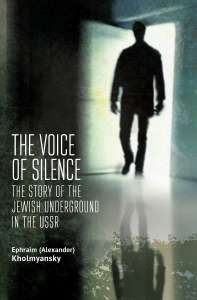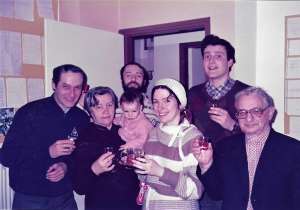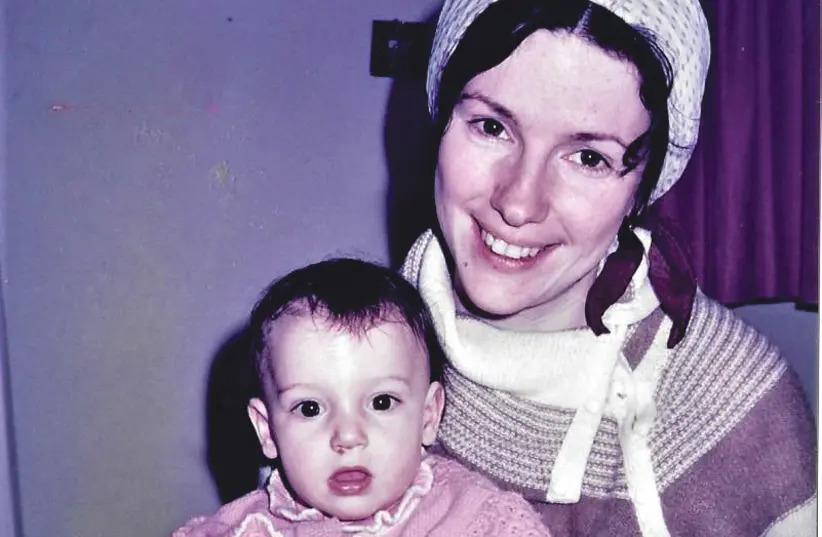In a frosty February of 1988, I took a short drive from my home in Efrat to Kibbutz Rosh Tzurim, in Gush Etzion. There was a special “seder” being held in honor of Tu B’Shvat, the New Year of the Trees, and in honor of their new residents, Anna and Alexander (Ephraim) Kholmyansky, who had recently arrived in Israel with their nine-month-old baby girl, Dora. They were warmly welcomed by the kibbutz that had adopted them from afar, and I interviewed them for the Charleston Jewish Journal.
I met them again recently at the book launch of Hidden Heroes, by Pamela Cohen, another wonderful documentation of the struggle of Soviet Jewry, that concentrates, from Cohen’s perspective, on what was being done across the ocean to help the struggle, and Ephraim Kholmyansky is mentioned in her book. Today, 34 years later, the Kholmyansky’s live in Ma’ale Adumim and have five children. Anna is a software advisor in Israel’s Central Bureau of Statistics. Ephraim worked first as the director of an ulpan under the Ministry of Education, later as adviser to olim (immigrant) scientists, in the Givot Olam oil exploration company, as an emissary of the Jewish Agency, and he was a partner in start-up companies. “Baby” Dora lives in Modiin, where she works in hi-tech, and has three girls.
The sages tell us that the Jewish people maintained three unique behaviors when in Egypt: Their Hebrew names, their (modest) dress, and their language: Hebrew.

In his book The Voice of Silence, The Story of the Jewish Underground in the USSR, Kholmyansky reveals to us the harrowing risks that Soviet Jews took in the 1970s and ’80s to study and to teach the Hebrew language, which included teaching the traditions and history of the Jewish people and of Israel.
His introduction is a fascinating and vital history lesson that places what comes next in context. He explains that, though the February Revolution of 1917 gave a short reprieve from the years of persecution and pogroms against the Jews in Russia and the Ukraine, with the Bolshevik takeover six months later, a civil war led to atrocities against the Jews; 150,000 were murdered in pogroms. He writes, “If most Jews supported the Bolsheviks, who emerged victorious in the 1920’s, it was in large part because the establishment of Communist rule put an end to the pogroms.”
The Jews thought that what followed would be a society based on justice and fairness. But Stalin denied recognition of the Jews as an ethnic group, he held anti-Semitic campaigns and Hebrew, he writes, was officially banned.
Half a million Jews joined the Red Army and fought the Nazis in WWII, 150,000 died in that war, and many of them also fought as partisans. Yet, the Soviet government refused to recognize the role the Jews had played in the war and also did not acknowledge the Nazi massacres of Jews; “Jews were not allowed to hold memorial events at the site of mass killings.”
Elie Wiesel, in 1966, published his landmark book, The Jews of Silence. Yet, something was happening beneath the surface, and the Six-Day War changed everything. “Jews who had been estranged from Israel and their Jewish heritage, used to being despised and insulted, suddenly made a quantum leap to a new reality. Almost overnight, they regained their sense of national identity,” writes Kholmyansky. They began to challenge the Soviet regime, both clandestinely and sometimes openly. Only years later did the Iron Curtain begin to slowly open.
Kholmyansky was in kindergarten when he first learned he was Jewish, when a census taker visited their home and asked him mother their nationality. It was a terrifying shock for him, but by the 7th grade, he was making lists of prominent and successful Jews. Later he discovered, by accident, in his brother’s room, a small calendar in Hebrew and Russian. There were words written there that he was not familiar with, like yishuv, kibbutz, and aliya. He felt he had discovered a treasure.
Several years later he was in a school where “the Jewish question kept coming up. We talked about Jews who were active in revolutionary movements around the world…And one day I felt the first stirrings of an idea…if only I could go away…to a free country…
“But where would I go? The daily barrage of anti-Zionist invective in the newspapers finally led me to pick up a map.” He was astonished at how tiny Israel was. How did people live there? What courage, he thought.
And then the Six-Day War erupted. “Jews who had been estranged from Israel and their Jewish heritage, used to being despised and insulted, suddenly made a quantum leap to a new reality. Almost overnight, they regained their sense of national identity…For the first time, they felt that being Jewish was a good thing.” He describes the “river of faces” he observed streaming toward the one Moscow synagogue that had not been shut down by the Soviets, on Simchat Torah in 1967.
Three years later, in the summer of 1970, a group of 16 refuseniks – 14 of them Jewish – tried to hijack a plane to freedom. Suddenly, “thousands of Soviet Jews were flooding visa offices all over the country…demanding to emigrate to Israel.” His family also wanted to emigrate, but they faced a number of obstacles that prevented their aliya.
Kholmyansky plunged himself into the study and, eventually, the teaching of Hebrew. “My Hebrew studies cast a new light on my whole life…I felt the joy of learning new words…Their sounds resonated within my soul, enveloping it with a new serenity, like a touch of something eternal.”
He taught in an immersive experience called the dibbur. He passed around copies of Russian-language brochures on the Jewish holidays, brochures that had been typed on manual typewriters or photographed and then developed in peoples’ bathtubs. He discovered the underground samizdat movement, comprised of aliya activists who published underground magazines about Jewish culture, history and the holidays. He was amazed at their courage. Future Speaker of the Knesset Yuli Edelstein was one of his colleagues in the teaching of Hebrew.
His request to emigrate was denied; he was now defined as a refusenik. He was fired from his job as an engineer when he applied to emigrate and had to take a job as a menial laborer, so as not to be accused of the crime of “parasitism.” He received encouraging letters from Israel, including from Rivka Barzilai of Kibbutz Rosh Tzurim, the kibbutz that “adopted” his family.
The KGB stepped up their efforts against the samizdat. The writers were careful to not write anything anti-Soviet, but he writes, “the very existence of a free Jewish press was intolerable to the regime. To us, however, it was a great psychological boost.”
Kholmyansky initiated the Cities Project, whose goal was to prepare teachers to teach Hebrew in the provinces beyond Moscow.
“In late 1979 there were 50 Hebrew teachers in Moscow and 15 in Leningrad,” he said in a phone interview. “If you ask any of them, they will say it was underground. But it wasn’t. The authorities knew about it and tolerated it to a certain degree. The KGB wanted to prevent the proliferation of Hebrew to other cities, and 75% of the Jews of the USSR resided in those cities, cities like Odessa and Minsk and Kiev, and that was the grand challenge I took upon myself… It was much more dangerous than teaching in Moscow…We concealed our operation.”
Eventually, the KGB harassment “gave way to crude, brazen intimidation.” He continued the Cities Project in spite of it. “I couldn’t let the project fail. It was my calling, my purpose in life.”
The Project was fraught with dangers and risks, involving intricate subterfuges. He wrote down their data base in tiny handwriting on pieces of paper that were transferred from one person to another, with instructions to destroy it if the KGB came to search one’s home. He writes that he learned that method of a “mobile storage system” by reading how U.S. strategic missiles were not kept in one location but moved around via underground passages, to protect them in case of a Soviet attack. When his mother, who held one of the written data bases, came home to find their apartment being searched by the KGB, she went into the bathroom and flushed the tiny pieces of paper down the toilet.
They Hebrew teachers took backpacks filled with materials to distant places, always fearing discovery. Jews from America smuggled in electronic devises that could be sold on the black market to support the project. Kholmyansky’s brother, Misha, was one of the leading teachers. He also helped with the production and hiding of Hebrew teaching materials and Hebrew audio tapes. Their parents knew about their activities and supported them, even though it might mean losing their jobs.
When they wanted to meet people, messages regarding the time and place were done in code. People who were part of their network were taken in for questioning by the KGB, their homes were searched, they were threatened with losing their jobs. He worried about those who were involved. But he writes that quitting was not an option.
A friend in the project, from a different city, asked Kholmyansky to meet someone named Anna, and to send something through her. They fell in love. Anna says, today, laughing, “We met in the Underground” but she is referring to the metro.
Things escalated. Kholmyansky was arrested in Tallinn, capital of the Estonian Soviet Socialist Republic, on 29 August 1984. While detained, a search was done in his parents’ home, where he lived, and on a trumped-up charge of a gun being found — obviously planted — he was first put in administrative detention and later criminal charges were filed against him.
“I was arrested because I was the initiator and leader of the Cities Project,” he told me. “The weapon was an excuse. They wanted to create a show trial. They didn’t pick me arbitrarily; it was because I did something that they wanted to prevent, to eradicate.”
The description of his prison cells, including freezing cold punishment cells to which he was sent, is horrifying. He began a hunger strike, which he also continued after he was sentenced. When he was hospitalized in the prison hospital, his weight was 42.5 kg (93.7 pounds) he is at 172 cm (5’6”) tall.
“They wanted to break me,” he writes, “and use me as an example to intimidate all the other members of the Jewish movement.” His hunger strike broke, to the best of his knowledge, all the records. He continued it for 207 days. Then they began to force-feed him, sometimes with brutal force.
Occasionally there would be a kind Russian guard who would secretly break the rules, in order to help him. Even in that cruel system, there were sometimes people who retained their humanity.
What gave him strength was his beliefs in what he was doing. Even when he was in a punishment cell, sleeping on a freezing floor with nothing to provide warmth, he felt free in his soul. He prayed. He thought. He quotes Victor Frankl, who said, “Everything can be taken from a man but one thing: the last of human freedoms – to choose one’s attitude in any given set of circumstances, to choose one’s way.”
The questioning continued. “It was getting harder to concentrate. I began to have vivid hallucinations…I was King David, Alexander the Great, Napoleon Bonaparte. Each new fantasy was a blessing, helping me last another hour, win another small victory.”
After four and a half months of hunger striking, Ephraim was brought to court. He was ultimately exonerated on the worst charge – possession of a weapon – and his final sentence was, surprisingly, less than he expected; the prosecution was frustrated that it wasn’t worse. Ephraim was wisely advised to not appeal the sentence, because there was the danger that he could lose the appeal and receive even more time in prison.
He was finally freed on February 2, 1986, after which “I embarked upon an intensive and prolonged therapy, everything from conventional medicine to massage, acupuncture, and Chinese herbs.” A number of months later, after the doctors determined he was sufficiently recovered, Ephraim and Anna married. But they still did not receive permission to emigrate.
He felt there was some change in the air, and a “window of opportunity.” He was joined by others in creating a group of former Prisoners of Zion, who lobbied to have remaining prisoners released, and led the founding of the group “Jewish Women against Refusal.”
“On October 18,” he writes, “Anna started her own hunger strike, which lasted for twenty-four days…It looked as though nothing had changed.” She was protesting a Soviet regulation that prevents couples from leaving the country without a written financial waiver from both sets of parents. Anna’s father had refused to sign. “I wasn’t fasting in protest against my father, but against the Soviet law,” she told me in 1988. She also said in our interview back then, as she glanced involuntarily at the ceiling. “I’m not used to being able to speak in a normal tone of voice. In Russia, our home was bugged. We had to write almost everything down.”

One day, in early 1988, the eavesdropping equipment in their apartment was dismantled, and three days later they got a phone call from the visa office. “Our decade-long struggle was over.” On January 28, 1988, they landed at Ben Gurion Airport, where they received a glorious welcome from the members of Kibbutz Rosh Tzurim.
A slender and gentle person, it is hard to imagine that the big Russian giant saw this young Hebrew teacher as such a threat to their country, but they did.
The descriptions in “The Voice of Silence” of the extreme devotion, in the face of danger, by the dedicated Hebrew teachers, the horror of living in a society where there was no acceptance, by the rulers, of values like truth, honesty, fairness and true justice — and the terrible conditions that Ephraim suffered for his beliefs and his actions — all this makes for captivating reading. Now, it is also particularly timely reading amid the current Russia-Ukraine crisis.
If there is a smart Hollywood producer who reads this – here is your next film. It has everything. Action. Secrecy. Grassroots rebellion. Even a love story.
I asked Kholmyansky, “Where did you find the emotional strength to do what you did?”
He replied, “I wanted to be a part of Am Yisrael, part of this large extended family. I never dreamed I would be up against the KGB, but it happened one step at a time.” He felt that “75% of the Jewish people [in the USSR] were being lost, and we had to do something about it. I decided, I am not willing to be a victim. I want to fight. And once you begin, you continue.”
The book was published by Boston: Academic Studies Press (2021) and is part of their series “Jews of Russia & Eastern Europe and Their Legacy.”
Hopefully, it will introduce both Jews and non-Jews, young and old, to the courage, the faith, and the sacrifices of the young underground Hebrew teachers of the USSR, whose voices are silent no more.
*
Toby Klein Greenwald is an award-winning journalist, an educational theater director and the editor-in-chief of WholeFamily.com. She and her husband live in Efrat and have children and grandchildren who live throughout the land of Israel.
Republished from San Diego Jewish World


























